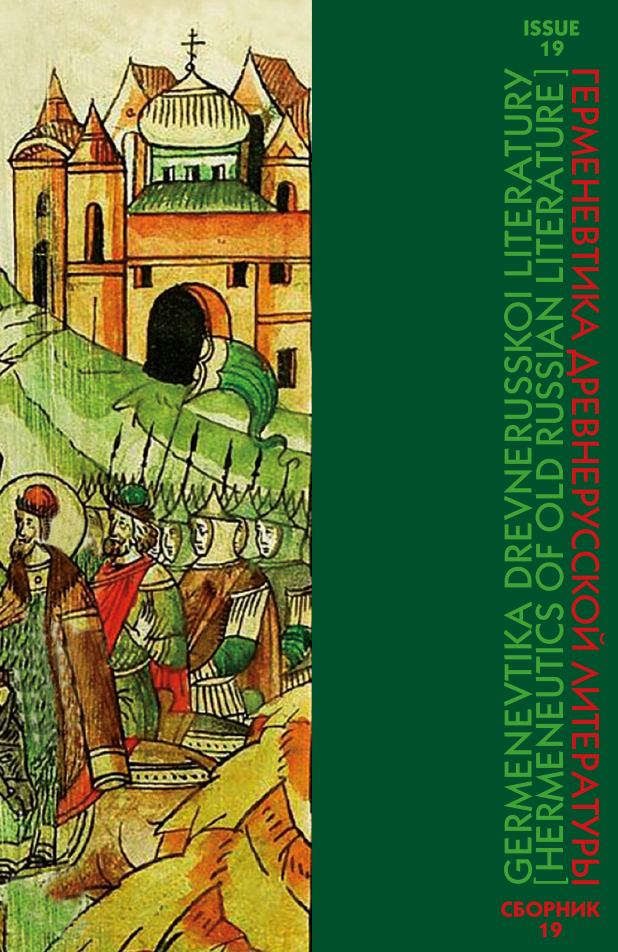Acknowledgements:
The work was carried out at the National Research University Higher School of Economics within the the project “Semiotics of Book and Non-book Text — the Slavic World between East and West.”
Abstract:
The article examines Schwank on “one Moscow patriarch.” Among the numerous pieces of literature printed on the territory of German states in the 17th century, one can still find unknown sources on the history of Russian-European relations. The vocal work, composed by the Baroque music theoretician, composer and writer Georg Daniel Speer (1636–1707), is one of them. It has all the features of the earlier Fastnachtsspiel, or fabliau set to music with a considerable number of immodest details. Quiproquo in the bedroom is a traditional plot of these stories known throughout Europe, but in this case, “one Moscow patriarch” acts as the main character of opus. However, nothing will distinguish him from a German priest or a French abbot. On the contrary, music that accompanies the vocal piece is called Moscow Dance and probably reflects the composer’s ideas about secular music of Muscovy state. All this gives evidence to the fact that by the last quarter of the 17th century, Muscovy in ordinary consciousness of Europeans was turning from an exotic and fabulous territory into a country in the neighborhood, about which familiar jokes are told.
REFERENCES
1 Alekseev, M.P. “‘Russkii iazyk’ u nemetskogo poeta XIV veka: [Osval’d fon Vol’kenshtein]” [“‘Russian Language’ by a German Poet of the 14th Century: [Oswald von Wolkenstein]]. Alekseev, M.P. Russkaia tema v evropeiskoi literature: Sb. statei i materialov [Russian Theme in European Literature: Collection of Articles and Materials]. St. Petersburg, Nestor-Istoriia Publ., 2019, pp. 75–91. (In Russian)
2 Viktorov, A.E. Opisanie zapisnykh knig i bumag starinnykh dvortsovykh prikazov [Description of Notebooks and Papers of Old Palace Orders], issue 1. [4]. Moscow, Tipo-litografiia S.P. Arkhipova i K° Publ., 1877. 376 p. (In Russian)
3 Zamyslovskii, E.E. Snosheniia Rossii s Shvetsiei i Daniei v tsarstvovanie Fedora Alekseevicha [Russia’s Relations with Sweden and Denmark in the Reign of Fyodor Alekseevich]. St. Petersburg, Tipografiia tovarishchestva “Obshchestvennaia pol’za” Publ., 1889. 36 p. (In Russian)
4 Kolpakova N.I. “Dissertatsiia ‘Tsurkov’ Moskovskii’ Ioganna Shvabe” [“Dissertation ‘Moscow Church’ by Johann Schwabe”]. Rukopisi. Redkie izdaniia. Arkhivy. Iz fondov otdela redkikh knig i rukopisei Nauchnoi biblioteki MGU [Manuscripts. Rare Editions. Archives. From the Collections of Department of Rare Books and Manuscripts of Scientific Library of Moscow State University]. Moscow, Novyi khronograf Publ., 2017, pp. 134–168. (In Russian)
5 Liustrov, M.Iu. “Russko-shvedskie literaturnye sviazi v XVII–XVIII vv.” [“Russian-Swedish Literary Relations in the 17th–18th Centuries”]. Germenevtika drevnerusskoi literatury [Hermeneutics of Old Russian Literature]. Issue 13. Moscow, Znak Publ., 2008, pp. 13–272. (In Russian)
6 Petrovskaia, I.F. Drugoi vzgliad na russkuiu kul’turu XVII veka. Ob instrumental’noi muzyke i o skomorokhakh: istoricheskii ocherk [Another Look at Russian Culture of the 17th Century. On the Instrumental Music and Buffoons: a Historical Sketch]. St. Petersburg, Kompozitor Publ., 2013. 288 p. (In Russian)
7 Preobrazhenskaia, A.A. “Khristiane li moskovity? Ob izdanii dissertatsii shvedskogo pastora Nikolaia Bergiusa” [“Are Muscovites Christians? On the Publication of Dissertation of the Swedish Pastor Nikolai Bergius”]. Shagi/Steps, vol. 7, no. 3, 2021, pp. 339–344. (In Russian)
8 Russkaia demokraticheskaia satira XVII veka [Russian Democratic Satire of the 17th Century], prep. of texts, essays and comments V.P. Adrianova-Peretts. Moscow; Leningrad, AN SSSR Publ., 1954. 292 p. (In Russian)
9 Aarne, Antti Amatus. The Types of the Folktale: Antti Aarne’s Verzeichnis der Marchentypen, trans. and enl. by S. Thompson. Helsinki, Acad. Scient. Fennica, 1961. 588 p. (In English)
10 Bedier, Joseph. Les fabliaux: Etudes de litterature populaire et d’histoire litteraire du moyen age. Paris, Bouillon, 1893. XXVII, 485 p. (In French)
11 Falvy, Zoltan. “Speer: Musicalisch-Turckischer Eulen-Spiegel.” Studia Musicologica Academiae Scientiarum Hungaricae, no. 12, Fasc. ., 1970. S. 131–151. (In German)
12 Koch, Klaus Peter. “Musiker-Migration und Musik-Migration: Bemerkungen zu den deutsch-sudosteuropaischen musikkulturellen Wechselbeziehungen bis zum Anfang des 19. Jahrhunderts.” Kultur und Literatur der Fruhen Neuzeit im Donau-Karpatenraum: Transregionale Bedeutung und eigene Identitat, Hrsg. von Tunde Katona und Detlef Haberland. Szeged, Grimm Verlag, 2014 (=Acta Germanica Schriftenreihe des Instituts fur Germanistik der Universitat Szeged. Bd. 14). S. 486–501. (In German)
13 Morozov, Alexander. “Die Reise des Simplicius Simplicissimus nach Moskovien.” Ost und West in der Geschichte des Denkens und der kulturellen Beziehungen. Festschrift fur Eduard Winter zum 70. Geburtstag. Berlin, Akademie-Verlag, 1966. S. 143–131. (In German)
14 Moser, Hans Joachim. “Daniel Speer als Dichter und Musiker.” Moser, H.J. Musik in Zeit und Raum. Ausgewahlte Abhandlungen. Berlin, Merseburger, 1960. S. 119–144. (In German)
15 Moži, Alexander. “Daniel Speers Werke: Ungarischer Simplicissimus und Musicalisch Turckischer Eulen-Spiegel.” Studia Musicologica Academiae Scientiarum Hungaricae. Bd. 17, Fasc. ., 1975. S. 167–213. (In German)
16 Roberts, Rosemary, Butt, John. “Speer Daniel.” New Grove Dictionary of Music and Musicians, vol. 24. 2nd ed. London; New York, Macmillan, 2001, pp. 168–169. (In English)
17 Robertson, Michael. Consort Suites and Dance Music by Town Musicians in German-speaking Europe, 1648–1700. London, New York, Routledge, Taylor & Francis Group, 2016. XXVIII, 236 p. (In English)






